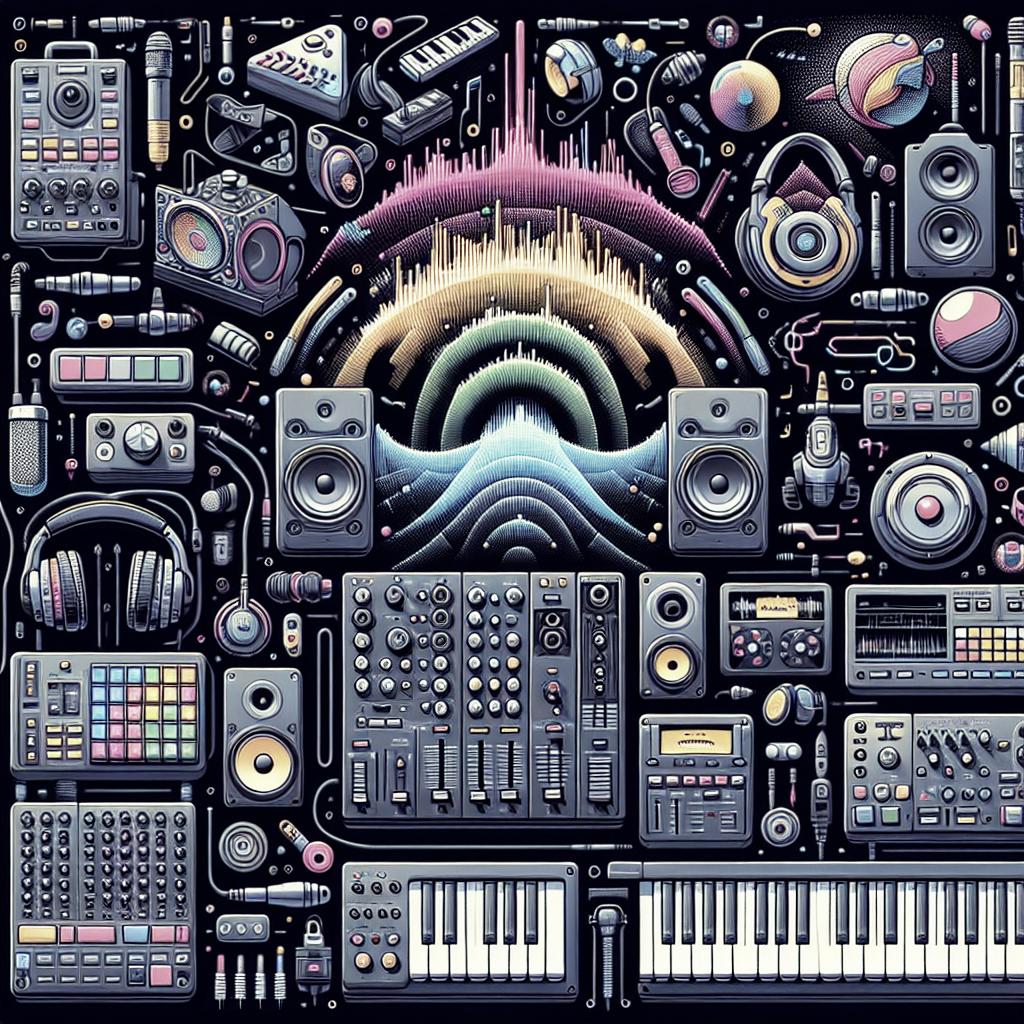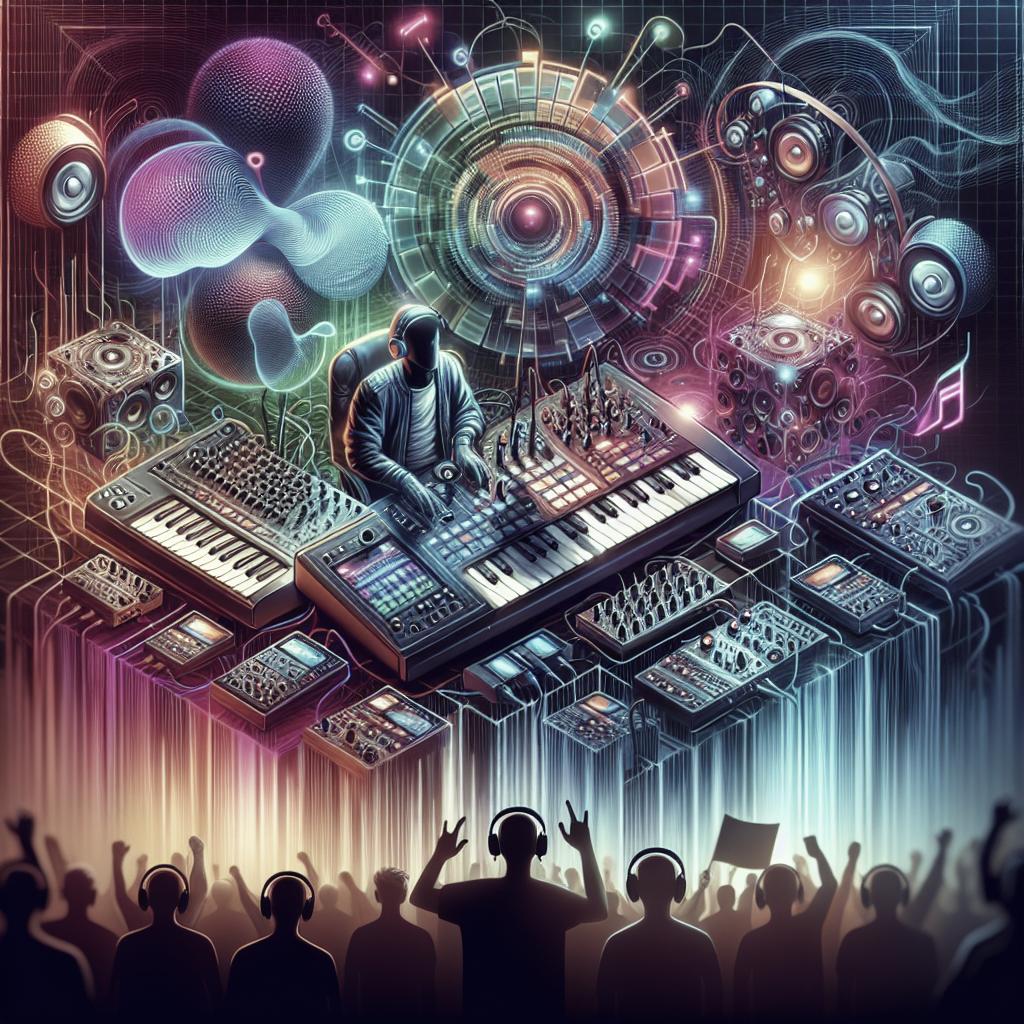<>
Electronic music has evolved into a diverse and influential genre, leaving an indelible mark on modern music. Its origins can be traced back to a handful of pioneers whose groundbreaking work set the foundation for today’s electronic landscape. This article delves into the most iconic figures in electronic music, exploring their contributions, innovations, and legacies. From the pioneering sounds of Kraftwerk to the ambient landscapes of Brian Eno, the genre-defining intelligence of Aphex Twin, the disco exuberance of Giorgio Moroder, the synth-pop brilliance of Depeche Mode, and the cinematic prowess of Vangelis—each artist has distinctively shaped electronic music. Through a closer look at these legendary artists, we gain insight into the rich tapestry of electronic music and its enduring impact on global culture.
Kraftwerk
Hailing from Germany, Kraftwerk is widely regarded as the godfathers of electronic music. Formed in the early 1970s by Ralf Hütter and Florian Schneider, Kraftwerk pioneered the use of synthesizers, drum machines, and vocoders, laying the groundwork for many of the electronic sounds that are prevalent today. Their visionary approach combined with minimalist aesthetics created a unique sound that was both futuristic and timeless. Tracks like “Autobahn” and “Trans-Europe Express” are considered milestones in electronic music, influencing countless artists across various genres. Kraftwerk’s influence extends beyond music; they changed the way artists and audiences perceived electronic sounds, pushing the boundaries of what was sonically possible. Their live performances are just as innovative, incorporating visuals, robotics, and meticulously crafted backdrops to create an immersive experience. The band’s legacy is evident in the countless musicians who cite Kraftwerk as a major influence, from techno and dance music producers to mainstream pop artists.
Brian Eno
Brian Eno, an English musician, composer, and producer, is often credited with developing the genre of ambient music. His approach to electronic music is more about creating landscapes rather than structured songs. Albums like “Music for Airports” and “Another Green World” showcase his talent for producing lush, atmospheric soundscapes that invite listeners to immerse themselves fully. Eno’s work has been instrumental in broadening the horizons of electronic music, making it more accessible and varied. In addition to his own groundbreaking work, Eno has had an enormous impact on other artists through his production skills. He has worked with a wide range of musicians, from U2 and Talking Heads to David Bowie, bringing an electronic touch to their work that has often resulted in some of their most acclaimed albums. His innovative techniques and willingness to experiment have earned him a revered spot in the pantheon of electronic music greats.
Aphex Twin
Richard D. James, known by his stage name Aphex Twin, is a seminal figure in the world of electronic music. Emerging in the early 1990s, Aphex Twin’s work is characterized by its complexity, innovation, and emotional depth. Albums like “Selected Ambient Works 85-92” and “Drukqs” are hailed for their inventive use of sound design and intricate rhythms. James’s ability to blend ambient textures with complex beats has made him a favorite among both critics and fans. Aphex Twin is also known for his enigmatic persona and compelling visuals, which often accompany his music. His influence can be seen in the work of contemporary electronic artists who strive to push the boundaries of the genre. Whether it’s through his mesmerizing live shows or his genre-defining albums, Aphex Twin continues to be a pivotal figure in electronic music, inspiring a new generation of musicians.
Giorgio Moroder
Italian composer and producer Giorgio Moroder is often heralded as the father of disco and a pioneer of electronic dance music. His work in the 1970s, particularly with the legendary singer Donna Summer, revolutionized the music industry. Tracks like “I Feel Love” introduced a new kind of electronic dance music, characterized by its hypnotic beats and innovative use of synthesizers. Moroder’s work laid the groundwork for the electronic dance music (EDM) explosion that would come decades later. Beyond disco, Moroder has also made significant contributions to film music, composing scores for iconic movies such as “Scarface” and “Top Gun.” His pioneering use of digital instruments and synthesizers in these scores has paved the way for modern electronic film music. Giorgio Moroder’s influence is palpable in various facets of electronic music, making him a towering figure in the genre’s history.
Depeche Mode
Emerging in the 1980s, Depeche Mode is one of the most successful and enduring bands in electronic music. Formed by Vince Clarke, Andrew Fletcher, Martin Gore, and Dave Gahan, the band originally had a synth-pop sound, which evolved into a darker, more complex style over the years. Albums such as “Violator” and “Songs of Faith and Devotion” are considered masterpieces, blending electronic beats with soul-searching lyrics and emotive vocals. Depeche Mode’s influence on electronic music and popular culture is immense. They have sold over 100 million records worldwide and have inspired numerous artists across different genres. Their innovative use of synthesizers and sampling techniques set new standards in music production, and their thematic depth has resonated deeply with a broad audience. Depeche Mode continues to be a force in the music industry, drawing huge crowds to their live performances and maintaining a relevance that few bands can boast.
Vangelis
Greek composer Vangelis is best known for his work in film scores, where his lush, synth-driven compositions have brought electronic music to a broader audience. His score for “Chariots of Fire” won him an Academy Award and became iconic, but it is perhaps his work on “Blade Runner” that remains most influential. The “Blade Runner” soundtrack is a masterclass in creating atmospheric, futuristic soundscapes, blending orchestral elements with electronic instrumentation seamlessly. Apart from his film work, Vangelis’s solo albums have also garnered critical acclaim. Records like “Albedo 0.39” and “Spiral” showcase his ability to fuse progressive rock influences with electronic music, creating complex, evocative compositions. Vangelis’s work has had a profound impact on electronic music and continues to inspire artists across various genres. Final thoughts:
| Artist | Key Contributions | Notable Works | Influence |
|---|---|---|---|
| Kraftwerk | Pioneered the use of synthesizers and drum machines | “Autobahn”, “Trans-Europe Express” | Heavily influenced techno, dance music, and mainstream pop |
| Brian Eno | Developed the genre of ambient music | “Music for Airports”, “Another Green World” | Influenced a wide range of artists; acclaimed producer |
| Aphex Twin | Inventive use of sound design and complex rhythms | “Selected Ambient Works 85-92”, “Drukqs” | Pivotal figure in electronic music; inspired new generations |
| Giorgio Moroder | Father of disco and pioneer of electronic dance music | “I Feel Love”, soundtracks for “Scarface” and “Top Gun” | Significant influence on EDM and electronic film scores |
| Depeche Mode | Innovative use of synthesizers and sampling techniques | “Violator”, “Songs of Faith and Devotion” | Inspired numerous artists across different genres |
| Vangelis | Lush, synth-driven film scores | “Chariots of Fire”, “Blade Runner” | Profound impact on electronic music and various genres |


